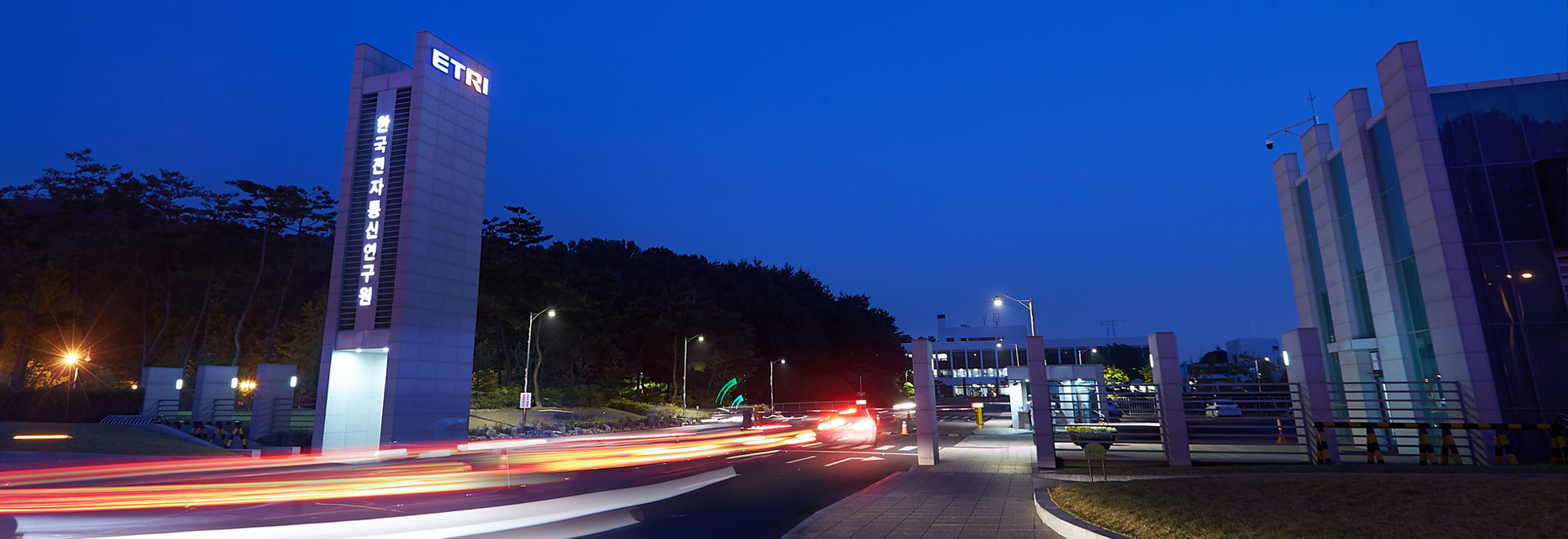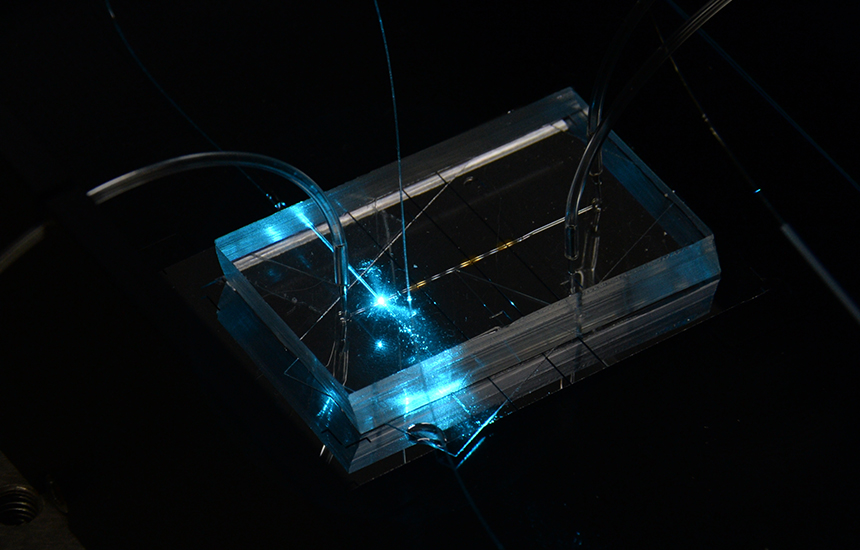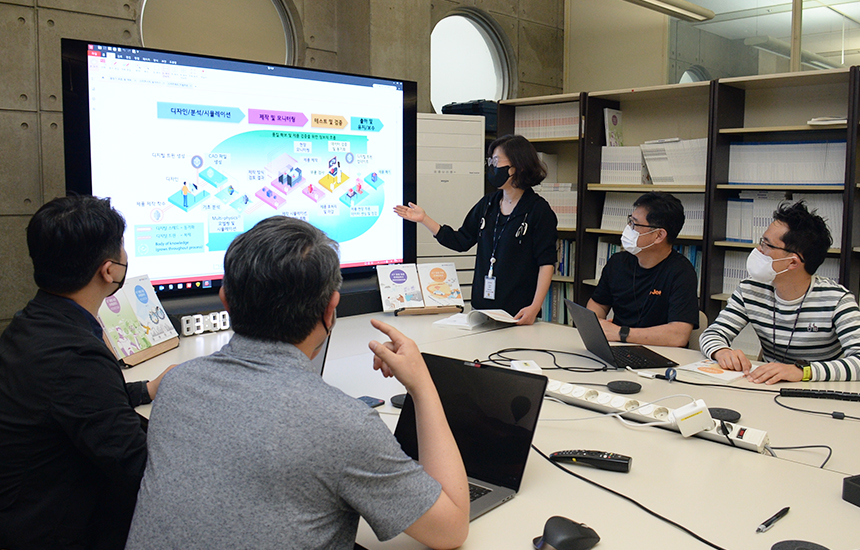
NEWS 1
Developed a droplet fluorescence reader which will promote the prevalence of the digital PCR
- Thanks to the development of a 3D chip-type optofluidic module and localization of
equipment & part, it will bring down the manufacturing cost by 50%
- Possible to apply to the test of COVID-19/cancer, detailed on-site diagnosis, new drug development, etc.

ETRI has succeeded in localizing the major part of the digital gene amplification (ploymerase chain reaction: PCR) test equipment, which has been attracting attention as a next-generation genetic diagnosis technology. It is expected to protect the citizens more safely from high-risk infectious diseases such as COVID-19 and MERS by facilitating a rapid supply of inspection equipment.
General PCR test equipment amplifies a sample of about 20 μl (one-millionth of a liter) at a time for molecular diagnosis. But if the gene concentration in the sample is too low, the gene cannot reach the criteria of a positive threshold even when it is amplified. Therefore, a false negative result may be derived. By the way, the digital PCR test equipment creates 20,000 samples of 2nl (one billionth of a liter) fine droplets from the original sample and goes through a gene amplification process (PCR) for each individual droplet. After PCR, each droplet fluorescence is detected by ETRI’s ‘3D chip-type optofluidic droplet fluorescence reader’ with very low interference of excitation light. By determining the percentage of positive droplets in the original sample, it can derive the diagnosis results significantly more accurately than a general PCR test equipment.
Moreover, the ETRI research team reduced the cost of parts by half, replacing expensive
optical components such as lenses, mirrors and bulky objective lenses, with the ‘3D chip-type optofluidic droplet fluorescence reader’, which utilized optical fibers. This technology can be commercialized right away as it can substitute the existing parts of the digital PCR molecular diagnostic equipment on the market.
In the future, the research team plans to develop cost-effective digital PCR equipment which can be used on the site conveniently through collaboration with a digital PCR test equipment developer and release it on the market.
Jin Tae Kim, Principal Researcher
Diagnostic & Therapeutic Systems Research Section
(+82-42-860-6005, jintae@etri.re.kr)
NEWS 2
Global ICT standardization led by ETRI
- Accomplished 85 cases of the international standard patent last year, cumulatively 1,017 cases
- Outstanding achievements in the AI, 5G, next-generation video compression, etc.

ETRI has achieved remarkable accomplishment in the field of international standardization last year in the new ICT R&D environment focused on untact society triggered by COVID-19. Hereby, it is expected that ETRI will further strengthen the leadership of global ICT standardization in the era of new normal.
ETRI has secured a cumulative 1,017 cases of the international standard patents by gaining 85 cases last year. Also, it has achieved 31 cases of international standard setting, and 42 cases of submitted documents reflecting the ETRI international standard patents. These are the top-class achievement of international standardization among domestic organizations. This achievement is analyzed as the result of promoting the entire life cycle of standardization focused on de-facto standardization activities which has been tried by ETRI recently as part of organizational innovation and digital transformation efforts.
In the international standard patents which ETRI has acquired recently, numerous commercial standard patents with high market demand were included, such as 64 cases in the next-generation video compression standard field and 48 cases in the 5G mobile communication field. Therefore, a significant amount of patent royalty is expected. Especially, ETRI created outstanding achievements in the field of international standardization related to AI as the National AI Research Institute. ETRI has been expanding its influence in the standardization organizations by positioning a vice-chairman as a founding member of MPAI(Moving Picture, Audio and Data Coding by Artificial Intelligence), a global de-facto standard organization in the field of AI technology, and by taking the role of chairman of the AI-related group, which is newly established by W3C, a web standards development de facto standard organization.
In the future, ETRI plans to reinforce the activities of linking R&D, patent, standard, and open sources so that the developed standard can be used widely in the market. ETRI also plans to promote the development of cooperative standard among ministries and the open-source linkage-type standard, which considers the customer demand and industrial applications, as well as standards technology development based on the R&D
Shin-Gak Kang, Principal Researcher
Assitant Vice President, Standards & Open Source Research Division
(+82-42-860-6117, sgkang@etri.re.kr)
NEWS 3
Started development of standardization
and utilization guidelines for Metaverse ecosystems
- Discovering new convergence services and analying standards for the Metaverse ecosystems

ETRI has begun development of standardization and utilization guidelines for the “Metaverse” field.
As non-face-to-face services are expanding due to COVID-19, the Metaverse is highlighted as a next-generation ICT industry that enables daily life and economic activities beyond space-time constraints. However, for the Metaverse to be connected to actual industries and services, it is necessary to clearly define the technical elements, identify related convergence services, and develop standards to support them. Accordingly, ETRI has started development of framework document to support development and utilization of technologies and standards.
The framework document is a guideline that identifies new convergence services to be created based on future ICT advanced technologies and presents the standards necessary to realize the identified services. It is to predict the structure of the future industry ecosystem through ▲service modeling for the industry ecosystem ▲identify developed standards ▲analysis of standards that need additional development, etc., and preemptively present a blueprint of standards required by the market and services.
The research team will form an expert council with the participation of experts from the industry, academia, research, and other related government departments in Metaverse-related fields to promote the development of a Metaverse framework document. Later this year, the research team will hold a public hearing to collect balanced opinions and verify its effectiveness, and disseminate the developed framework document.
For strengthen the competitiveness of national standards, the research team plans to develop five framework documents in various convergence service areas by 2026.
Jun Seob Lee, Principal Researcher
Director, ICT convergence standards Research section
(+82-42-860-3859, juns@etri.re.kr)
NEWS 4
Developed quantum algorithm to attack
the noisy linear problem
- World-class, 『divide-conquer』 quantum algorithm,
conquered the noisy linear problem (LNP) with a small quantum computer

ETRI developed a quantum algorithm which can target the new encryption system in the quantum computer era, ‘post-quantum cryptography (PQC)’ with KIST, Seoul National University, Hanyang University, KIAS, Imperial College London (UK), etc.
Due to the advent of the celebrated Shor’s quantum factorization, it is expected that the cryptography system based on the factorization problem, e.g., Rivest-Shamir-Adleman (RSA), would not be secure, particularly when the quantum computer is to be developed.
Thus, a new crypto-system which is expected to be safe even against the quantum computer, so-called the “post-quantum cryptography (PQC)” has been emerged. PQC is based on a mathematical problem which is expected or believed to be difficult to solve even with the quantum computer. Accordingly, the researchers has attempted to establish (or define) the true meaning of the aforementioned “to be difficult to solve even with the quantum computer”, i.e., quantum resistance, and to find the corresponding problem. This is the same as specifying the hardness (usually, we call “computational complexity”) of the base problem in terms of the computational science. It is also equivalent to specifying the computational power of quantum computers.
The research team provided a quantum algorithm to attack the noisy linear problem (or often-called “learning-with-error (LWE)” problem), which offers primitives for post-quantum cryptography. The algorithm runs based on “divide-and-conquer” strategies, which is a method of dividing the entire structure into sub-structures and conquering them individually. The researcher team showed the exponential reduction in the sample complexity. Such a quantum speedup is equivalent to those reported in the previous studies. However, it is for the first time that it has shown the exponential quantum speedup in solving the noisy linear problem with a reasonable size of quantum sample. This result can present a certain criterion for evaluating whether the quantum speedup can be achieved in solving the noisy linear problem.
The team is currently planing to do the follow-up study on optimizing the amount of computational resources in the entire problem-solving process, namely from the preparation of the quantum sample to the main computation Through it, the team will do the full analysis about the quantum solvability of the noisy linear problems.
Jeongho Bang, Principal Researcher
Director, Quatnum Computing Research Section
(+82-42-860-6391, jbang@etri.re.kr)